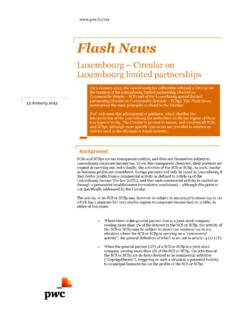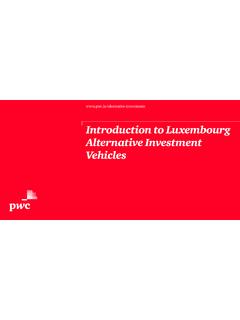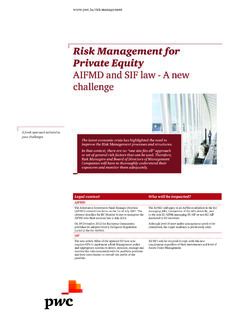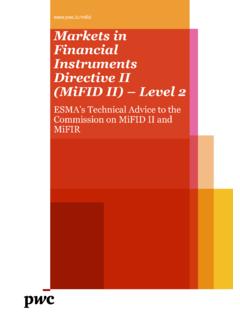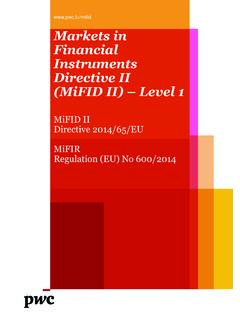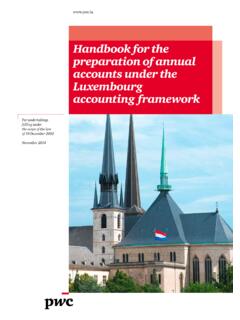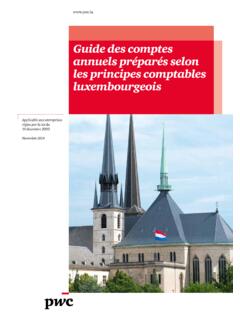Transcription of Luxembourg income taxes 2017 - PwC
1 Luxembourg income taxes 2017 Guide for of ContentsBasic principlesEmployment incomeDirectors feesDividend and interest incomeCapital gains 12345p4p8p9p9p10 Deductible itemsReal estate incomeSocial SecurityNew tax measures in 20186789p11p12p14p154 Basic principlesResident vs. Non-residentsResident taxpayerAn individual taxpayer qualifies as resident of Luxembourg when he has his tax domicile or usual abode in Luxembourg . Nationality is irrelevant when determining tax residence. A tax domicile is the permanent place of residence that the individual actually uses and intends to maintain. Individual taxpayers who don t have their tax domicile in Luxembourg will qualify as a resident if they have a usual abode in the Grand Duchy. To qualify for a usual abode status, a person needs a continuous presence of six months in Luxembourg (short absences are disregarded).
2 The six-month presence can overlap two calendar years. The residence applies as from the first day of taxpayerAn individual taxpayer qualifies as a non-resident of Luxembourg if he has neither his tax domicile nor his usual abode in Luxembourg . Luxembourg residents are taxable on their worldwide income , while Luxembourg non-residents are taxable only on their Luxembourg source taxpayers are in principle not entitled to the same range of deductions available to Luxembourg resident taxpayers. Non-residents, who are taxable in Luxembourg on more than 90% of their worldwide income , can opt to be treated as if they were Luxembourg residents. For Belgian residents, the option regime can be applied if 50% of the household s professional income is taxable in Luxembourg . The option regime allows non-resident individuals to deduct expenses via their Luxembourg income tax return that they would not otherwise be entitled to deduct.
3 The option regime is not mandatory and must be requested by a taxpayer via the income tax return. The tax benefit of the option regime has to be considered on a case-by-case yearIn Luxembourg , the tax year corresponds to the calendar subject to taxesThe categories of income , after deduction of related expenses, are aggregated to determine the net total income . The net income is then reduced by various deductions in order to determine the taxable income : Employment income ; Self-employment income ; Dividend and interest income ; Capital gains; Pension and annuity income ; Rental and royalty income ; Business income ; Agriculture and forestry income ; Miscellaneous & answersWhat if my family remains in my home country?If your family remains in your home country, the tax authorities should refer to the relevant Double Tax Treaty if any, to determine your tax Tax reformAs from 1 January 2017 , new tax measures for individuals entered into force further to the approval of the tax reform law by the Luxembourg Parliament.
4 The changes impacted tax rates and increased the ceilings applicable to certain deductions. We have indicated a * where a change has occurred for ratesIncome tax rates are progressive. They vary from 0% up to 42%*. A 7% surcharge for the Employment Fund applies on the income tax due. The surcharge for the Employment Fund amounts to 9% for taxpayers in tax class 1 or 1a with taxable income exceeding EUR 150,000 (EUR 300,000 for taxpayers in tax class 2). As from 2017 , the Temporary Budget Balance Tax no longer applies (previously it amounted to EUR of the gross salary).6 ResidentsNon-residentsTax class 2 Married taxpayersSame as a resident if not living apart and if taxable in Luxembourg on more than 50% of their household s total professional incomeWidowed persons for the three years following the year in which they became widowedSame as residents(1)Divorced or separated individuals for the three years following the year of divorce or separationSame as residents(1)Civil partners who live together for a full fiscal year who elect to file jointly and have a recognised partnership in place for the full yearSame as residents if the Luxembourg income derived by either partner exceeds 90% of his/her worldwide income for the full yearTax class 1aWidowed persons not included in tax class 2 Same as residents(1)
5 Individuals aged at least 65 on 1 JanuarySame as residents if specific conditions are met(1)Single parents where the child forms part of their householdMarried taxpayers not living apart and taxable in Luxembourg on 50% or less of their household s total professional income (1)Tax class 1 Taxpayers not included in tax classes 2 or 1aSame as residents(1)(1) If they derive professional income taxable in Luxembourg . Tax classesThe calculation of Luxembourg income taxes also depends on the applicable tax class, established according to the individual s personal situation. There are three tax classes: tax class 2, tax class 1a, and tax class net taxable incomeTax liability depending on tax classeEUR 30,000 EUR 60,000 EUR 120,000 EUR 240,000 Tax class 1 EUR 2,791 EUR 13,916 EUR 39,168 EUR 92,665 Tax class 1aEUR 1,277 EUR 13,159 EUR 38,411 EUR 91,908 Tax class 2 EUR 678 EUR 5,584 EUR 27,833 EUR 78,3377 Questions & answersShould I file jointly with my spouse?
6 Yes. Married taxpayers file jointly (with specific conditions to be met for non-residents). Civil partners who have a partnership agreement recognised in Luxembourg and who were living together for a full tax year can elect to file jointly (certain conditions apply for non-residents).What else do I need to know about filing obligations? In Luxembourg , not all taxpayers have to file an income tax return. But those who do, must file it prior to 31 March of the year following the income tax year (extension of this deadline is typically granted upon request). If the taxpayer is not subject to a filing obligation, he may file a simplified request for refund of excess withholding taxes under certain conditions. The purpose of such a request is to obtain a refund of excess payroll taxes (if any). This request must be filed prior must be filed prior to 31 December of the year following the income elements taken into consideration to determine if a taxpayer has to file an income tax return or request for a yearly calculation are: His/her residency status; His/her tax class; His/her level of income ; The nature of income ; The number of days worked in December 2018 Deadline for filing the simplified request for tax year 2017 (withholding tax adjustment)31 March 2018 Deadline for filing tax returns for tax year 20178 Employment incomeTaxable employment income generally includes all benefits in cash or in kind earned from an employment activity.
7 The taxable value of benefits in kind is assessed at the fair market value ( the cost that the employee would have paid if he had paid for the benefit himself). Luxembourg income Tax Law, however, provides for a lump sum valuation method or exemptions for certain benefits in kind:Luncheon vouchersThe taxable benefit per voucher is equal to EUR for a voucher value of EUR *. The taxable basis is reduced to the extent that the employee contributes to the related carThe taxable fringe benefit generated by the private use of a company car is equal to the private mileage multiplied by the kilometer cost of the car. A logbook indicating private mileage is to be held by the employee. Alternatively, a lump sum valuation method is available, according to which the monthly taxable fringe benefit corresponds to a rate ranging from to (depending on the CO2 emission and fuel type of the vehicle) applied on the price of the new vehicle, reduced by any discount granted (options and VAT included)*.
8 Free accommodationThe taxable fringe benefit amounts to the monthly rent and other rental charges paid by the employer. A reduction of 25% is applied to the rent, subject to certain conditions (the reduction does not apply to other rental charges) and a reduction of is applied if the accommodation provided is subsidy by the employerA loan granted by the employer at an interest rate lower than (rate as applicable on 31 March 2016) generates a taxable fringe benefit. The taxable benefit corresponds to the difference between the rate and the discounted interest rate. Interest subsidies paid by the employer apply where the employer provides financial support in connection with loan interest that the employee has with a third party. The interest subsidy by the employer generates a taxable fringe benefit in the hands of the above benefits are tax-exempt up to EUR 3,000 for mortgage loans related to the acquisition of a main residence and up to EUR 500 for other personal loans.
9 These tax-exempt amounts are doubled for taxpayers filing jointly and single taxpayers with dependent children. Occupational pension schemesThe employer s contributions to a qualifying occupational pension scheme are subject to a flat tax rate of 20% to be borne by the employer. Benefits received are tax-exempt in income tax exemptions Gifts by the employer based on the employee s seniority with the company. The exemption varies between EUR 1,120 and EUR 4,500. Overtime pay and extra pay for working nights, Sundays or public holidays. Severance pay (conditions apply).Employment related expenses Professional expenses related to employment income are tax deductible. A yearly lump sum deduction of EUR 540 is allocated to every employee. This deduction can be replaced by real expenses incurred (evidence should be provided).
10 In addition, commuting expenses are deductible based on the distance between the employee s home and work place. On a yearly basis, the maximum deduction for commuting expenses amounts to EUR 2, directors fees, whether they are paid to a resident or a non-resident director, are subject to withholding tax at the rate of 20%. The 20% tax is used as a tax credit against final income tax liability assessed on the basis of an income tax return. The 20% tax withheld is in full discharge in the hands of non-resident directors if (i) the gross directors fees do not exceed EUR 100,000 and if (ii) they have no other Luxembourg source professional income . However, said directors may opt to file an income tax return. In the scope of an individual income tax return, tax is assessed pursuant to progressive income tax rates.


